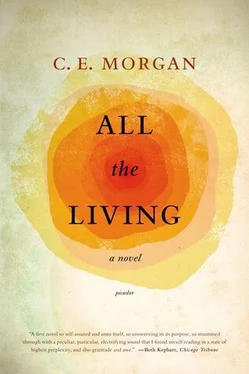Halfway home, Aloma said, I quit my job there.
What? When?
Well, only just two days ago, she said.
He looked at her carefully, his foot rising up off the gas just barely. You ain’t said a thing about it.
Well, I just kinda up and did it, she said, turning to the window so the wind whipped her mouth and snatched her words away.
And how come is that?
She shrugged and tried her best to look unconcerned as she gazed out. I think I have enough money saved now to rent a piano and I might could teach lessons up at the house. I’ll make us some money that way.
He nodded. That seems to me a good idea, Aloma. Then he said, I like to have you around. You think I don’t notice when you’re up there, but I do. I hear you singing. She looked over at him and watched him inhale deeply and stretch his shoulders and he knew she was watching, but he didn’t turn. When he reached into his breast pocket for a cigarette, she took it from his hand and found a lighter in the ashtray, lit it for him, dragged once, and passed it back. Thank you, he said and smoked as Aloma leaned her head way back on the seat so that she could feel the glass jittering in its frame under her head and her teeth rattled just so. Out of the corner of her eye, Aloma watched Orren drive, relieved that he said nothing more. When he turned into the gravel drive, she thought, Here I come back a married woman, but the thought was only a faint breeze, it stirred up nothing new. She looked at herself in the passenger mirror and the sun striking the glass also struck her eyes so they teared and blinked. When her eyes eased up, the truck was stopped and Orren — his cigarette flicked out the window and smoldering still in the gravel — was looking at her.
I got to ask you, Aloma.
What? she said, terrified, for she knew what he would say.
Do you got feelings for that man? He gripped the steering wheel now with both hands. Don’t lie to me. I know sometimes you lie to me.
I don’t lie to you, she said, genuinely startled.
He shook his head. You think you’re not lying to me when you don’t say nothing. But you are.
She could not say anything in return, because this was true.
Do you got feelings for that man? Orren said again.
I thought I did, for a while, she said very quietly.
He nodded and looked out over his hands through the windshield glass, up the swell of the yard to the house. She was afraid to follow his gaze, afraid to look anywhere but at his face.
Well, then how come you married me? He said this low, as if he were speaking only to himself.
She thought that over for a minute, not because she wanted to give him a good answer, only one that was no parts lie.
Mostly because I want you.
Like how, you want to fuck me?
Good Lord, Orren, she said and laughed soberly, looking out the side window at the world that was now turning and reddening with force. The change there surprised her eyes. She rubbed her brow with one hand. Then: God, I guess so, but more.
More what?
More, she sought around for the thing that was in her head that she’d never fitted words to. More like… when I have you, when I have you like that even, it’s not enough and I still want some more of you. When you say something, I want to hear you say more and when you go someplace, any place, I want you to come back more than anything. That’s pretty much been true for forever. That’s what I mean.
He listened.
Well, she said, wearied, that’s the whole truth. She checked the inside of her for any sign of falseness and it was not there. The glimpse she caught of herself this time in the passenger mirror was all eyes — red-rimmed, wide open.
Okay, he said and nodded and lifted his foot off the brake and dropped the truck into first so it swagged backward before the gear caught and he drove the rest of the way up the gravel drive. When he parked the truck, he did not look at her, but only shut the door behind him so that she was left alone in the cab. She waited on her side. She knew he was angry, but she waited all the same, because they had just married and a part of her hoped he might do something loving like carry her across the threshold of the house, which of course he did not, she knew it was foolish to even think it. When Orren reached the porch without once looking back, Aloma unlatched her own door with a sigh, let it fall heavily against its joints, bouncing and creaking into silence. By the time she followed onto the porch, Orren had already passed into the house. Aloma pulled the door gently shut behind her and stood holding the knob, leaning against it. Orren had pulled out a chair from the dining-room table and sat down, taking his cigarettes out of his pocket and placing them before him on the table along with his keys and the change from his trousers. He pushed his chair back so that his legs splayed out from the seat. He looked across the table out the window. The edges of her mouth turned down, Aloma gazed helplessly around her at the house, which did not speak to her of a home and maybe never would. Its wall of untold faces, the buckling piano, the memories which were not her own. Her eyes settled on Orren.
Let’s get rid of this piano, she said. It’s done.
He squinted as though at something a long ways off out the window, something he could not quite see, but to her surprise, he said, Maybe so.
And maybe move some of these pictures. We don’t need them all on one wall.
If you want, he said. Still, he would not look in her direction and so she crossed the room until she stood beside him, and frustrated, she said, Orren. But he sat, he just sat. So she hiked up her dress around her thighs and straddled her legs over his on the chair and unfolded his arms, which had been crossed over his chest, and placed his hands on her hips. Orren, she said and this time he looked at her because he could not do otherwise, but he did not resist when she kissed him and then he kissed her hard and when the chair nearly tipped, they lay on the floor, not bothering to remove their clothing because they did not have any time to spare, as all things both bad and good happen in an instant and they both knew it now, she and Orren both. And right after he came, before he could even catch his breath, while his face was still in the hair above her ear, his voice staggered in her ear, Don’t let nobody in you but me.
Her eyes, closed and all submitted, flashed open at once. What, she snapped. We get married and that’s the first thing you say to me?
He raised his head so his face was over hers. She saw the beads of sweat on his lip and the high ruddiness in his cheeks. I mean it, he said.
God, Orren, she said. Don’t boss me and fuck me at the same time, and she slid out from under him and hunted around for her underwear until she found it and she struggled back into it under her dress, feeling wet and undone. Her legs shook a little. Orren just lay there on the floor and watched her, and when she stepped over him to leave the room, he tucked himself into his pants and sat up, slowly. He put his head in his hands.
She turned around at the doorway to the kitchen. The thing with you, Orren, is you never ever say the right thing, she said and made to leave, but stopped abruptly. Her words knocked about the height of the house and came back to her. She listened to them echoing for a moment. Then she said much slower, in a tone stripped of rancor, without turning this time, Orren, don’t let’s fight this day or ever again, and she meant it as she said it, though she heard how useless it was, all the longing and futility that it encompassed, and she saw too that she would say it again in her lifetime, perhaps many times, and that it would be as tiresome then as it was now. She found suddenly that she was fatigued — mostly with herself — and she sagged sideways against the doorjamb and might have fallen over had it not been there, unyielding. Behind her she could hear Orren breathing, silent again. Suddenly Aloma straightened up and passed through the kitchen and out the back, but once there, she did not know where to go, she only knew that it was trouble in the house and trouble out of the house and there was nothing she could do about it short of trying on a new self, and she did not know how to do that. She couldn’t trust the world to make her happy for more than a minute at a time, and generally less than that, but her life had to be borne. She looked out toward the mountains and rolled her eyes. She had married someone who was fastened to this place, to these foothills, and she could not understand him no matter how hard she tried. She was no closer to that knowledge now that they were married than when they were not. And just as she was thinking these thoughts and sinking down in fatigue on the crumbling steps where she had fallen and scarred herself three months prior, just as she was thinking, Is it really him who makes me unhappy or is it just me after all, just then he appeared from behind her in the kitchen, a cigarette in his mouth.
Читать дальше
Конец ознакомительного отрывка
Купить книгу











